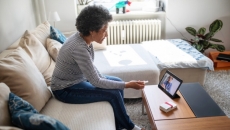Connected Health
The nonprofit urges early-stage women-led health startups to participate in the FemTech and HealthTech Grants Challenge.
The Michigan provider organization has been keeping COVID-19 patients at home – and recording a 95% satisfaction rate among patients in the program.
Remote patient monitoring technology improves care for these patients and raises HEDIS scores for the organization.
Frank McGillin talks about "on-demand" virtual care, virtual second opinions, chronic care management via telemedicine and telehealth personalization.
HIMSS21 Europe
Global healthcare leaders at the #HIMSS21Europe conference have called for the development of self-care apps, the enhancement of digital literacy and the transformation of clinician-patient communication to empower patients.
Other recommendations include boosting local production, promoting research and development, and creating robust quality management maturity.
HIMSS21
The result is a single hospital information system for data collection and management, linking medical professionals.
The health system invested heavily last year in telehealth and remote patient monitoring technologies to solve problems of the present and set itself up for the future.
Newly launched ConnectedCare365 offers remote patient monitoring, AI and data analysis tools.
Five analytics companies – Aetion, Flatiron Health, IQVIA, Syapse and Tempus – are joining to advance use of data derived from EHRs, claims and other sources outside of clinical trials.








